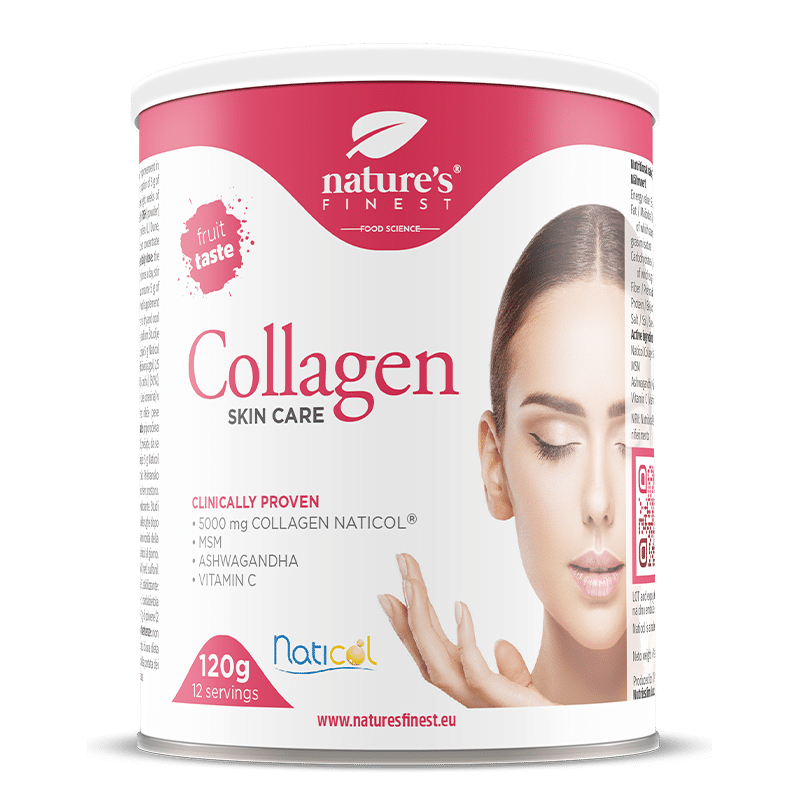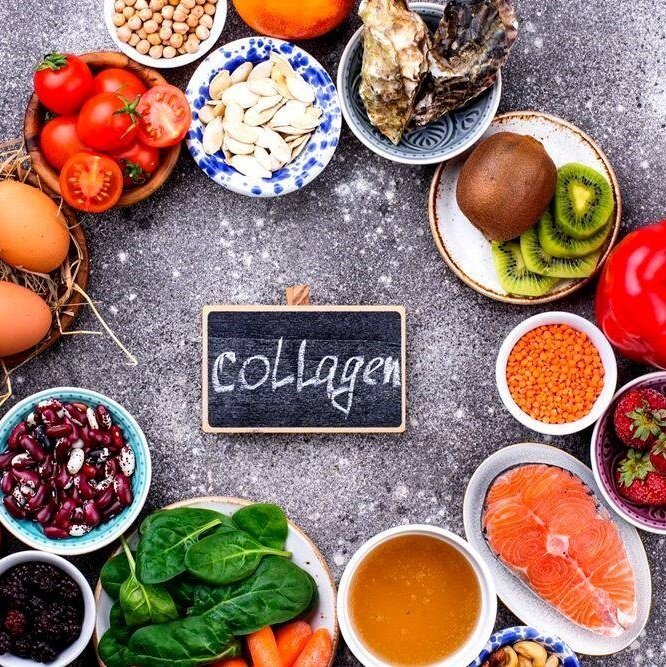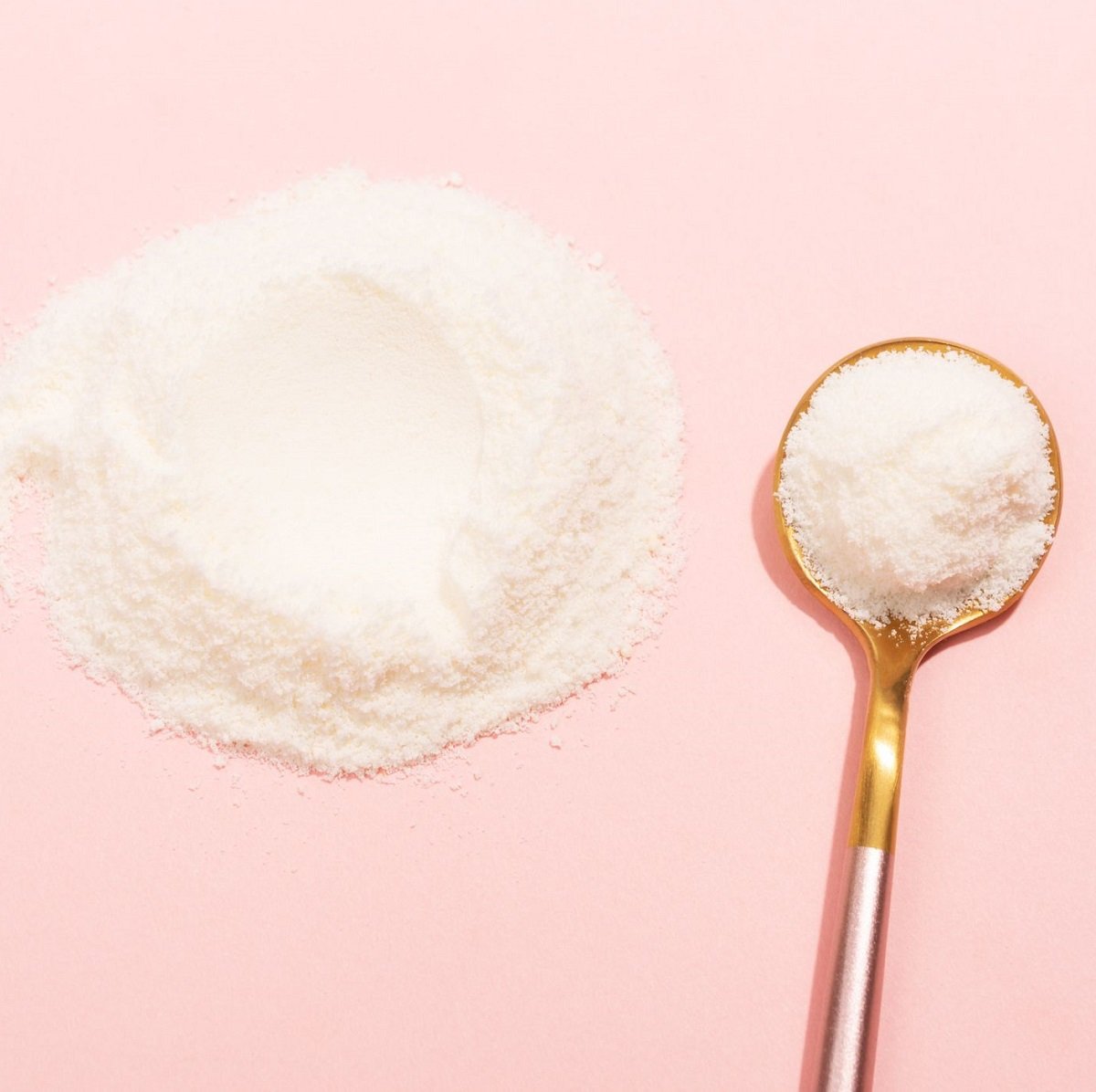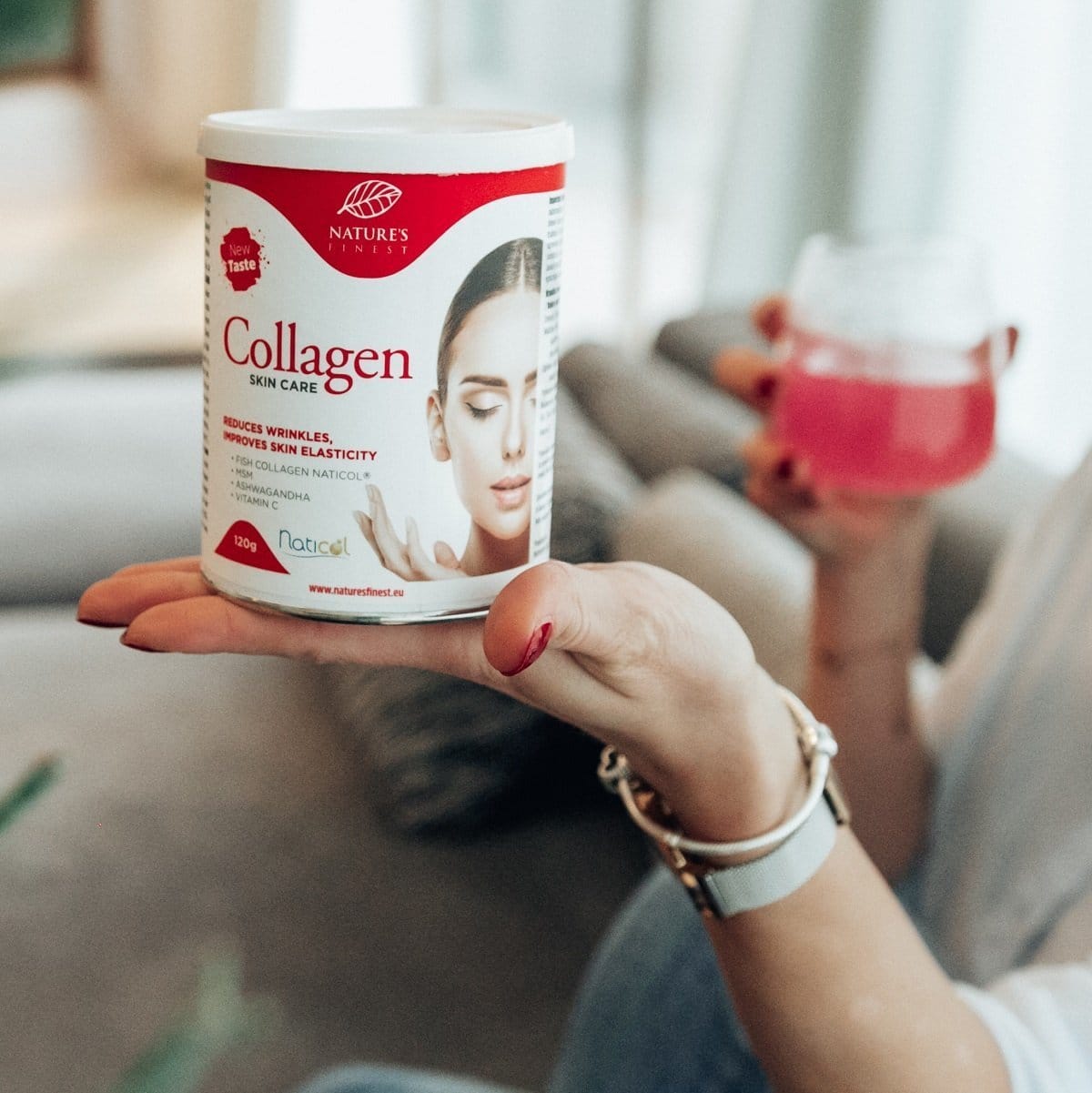Collagen – consumed with food or as a dietary supplement
No matter how we consume it, our body needs it! Why? Because collagen is an integral part of connective tissue and is present throughout the body. It is the most abundant protein in the human body, which may thus be 30% of all the proteins of the body.
Collagen is part of the heart, lungs, kidneys, arteries, joints, ligaments, cartilage, bones, nails, skin, hair, muscles, liver, intestines, genitals, spleen, brain, and many other organs. Collagen formation decreases rapidly after the age of 25, which affects many body functions. This is manifested not only in the appearance of the skin, but also in other body organs.
If we regularly consume collagen, with our diet or as a dietary supplement, the skin is not the only one that feels the positive effects. You’ve probably read or heard about the collagen’s positive effects on the skin. But collagen, found in skin care products or in the supplements, does not care only for firmer and more youthful skin without wrinkles, it is also responsible for the proper functioning of many other cells, organs, muscles and tissues.

Food for cartilage regeneration
Collagen not only has a positive effect on the elasticity and smoothness of the skin, which because of that looks younger, but also promotes healthy joint function, reduces inflammation in the body, helps restore the intestinal barrier and prevent Alzheimer’s disease, improves memory, lowers cholesterol levels and maintains a healthy heart. It also increases bone density, maintains strong bones, detoxifies the body and supports liver functions.
Collagen is a complex protein composed of 19 amino acids. Collagen is found in almost all organs – it represents 90 percent of the sclera, 80 percent of the tendons, 75 percent of the skin, 60 percent of the cartilage, 30 percent of the bones, and up to 10 percent of the muscle mass. Collagen acts as a glue in the body. It binds and supports the structure of the skin, muscle tissue, bones and tendons.
The word “collagen” comes from the Greek word kólla and the French suffix gen. The literal translation means “glue production”. Collagen actually acts in the body as a glue. This protein is concentrated in the extracellular matrix, which acts as a support system, looking like a network that holds cells together. Collagen also ‘sends’ signals to eliminate inflammation in the body and repair damaged cells.

Collagen SkinCare
Premium Naticol® formula that reduces wrinkles and boosts elasticity
- Patented fish collagen Naticol®
- Proven to reduce the appearance of wrinkles ¹
- Hydrolysed peptides for optimal absorption ¹
- Can improve skin elasticity and complexion homogeneity ¹
- With vitamin C, which contributes to normal collagen production ⁴
Slow down signs of aging with the most effective collagen available!
* Based on studies. Results may vary from person to person.
and save £5.31
100% safe purchase with a no-questions-asked return policy.
Our food contains natural collagen
Collagen can be consumed in the form of powders or bone broth, or with sufficient intake of foods containing the amino acids glycine and proline. These amino acids are needed for the body to produce collagen, which is why nutritionists call them essential amino acids. If we are healthy and our body is in optimal condition, our body can produce these amino acids by itself. In addition to glycine and proline, collagen is also composed of the amino acids hydroxyproline, hydroxylysine, and others. But due to external factors, such as stress, we need to get these amino acids, especially glycine and proline, through our daily foods, which are largely found in the vegan diet, or we get them through dietary supplements. Foods rich in glycine include bananas, beans, pumpkins, kiwi, kale, spinach, cabbage and cucumbers. Foods that contain a large amount of the amino acid proline are beans, asparagus, tempeh, chives, buckwheat, and alfalfa.
Glycine and proline are not the only nutrients the body needs to produce collagen. Vitamin C is also very important. Vitamin C is found in many types of fruits and vegetables such as strawberries, oranges, red peppers etc. In addition to vitamin C, the amino acid lysine, which is found in proteins necessary for collagen synthesis, is important.
Larger amounts of the amino acid lysine are found in beans, lentils, tempeh and quinoa. If you can’t eat these every day in the form of a natural diet, the easiest way to provide your body with what it needs to produce collagen is to take a dietary supplement in the form of collagen peptides.
Why add collagen to your diet?
There are 16 different types of collagen in the body, most of which are type 1. Our body produces its own collagen if it receives the necessary nutrients. However, the ability to absorb these nutrients and their intake begins to gradually decrease, which is affected by aging and irregular diet. After the age of 35, collagen production begins to slow down.
At the age of 40, collagen content decreases faster than the body can produce it. When we reach the age of 60, we have only half of the original collagen content.
By consuming collagen-containing foods or by taking dietary supplements in the form of collagen peptides, the process of collagen depletion in the body can be slowed down.

How does consuming collagen affect the body and its health?
Collagen is especially known for helping the skin look younger and more youthful. One study found that the group of people taking collagen peptides, the elasticity and moisture of their skin improved significantly. In older women, the improvement was even more evident as their body naturally no longer produces enough collagen. The elasticity of their skin improved compared to the placebo group after only four weeks (the change was most noticeable in older women).
Food rich with collagen have a huge effect on the skin and collagen production in the body. This type of food includes: celery, cucumbers, green vegetables, berries, cabbage and ginger.
Glycine and proline, amino acids found in natural collagen, are known for their anti-inflammatory properties, so they also help to reduce joint pain and relieve joint stiffness in a natural way. Foods that support joint function and health include garlic, leeks, onions, apples, almonds, chia seeds, pineapple, extra virgin olive oil, bananas, turmeric and ginger.

Consumption of collagen also helps with digestive problems, such as irritable bowel syndrome, reflux, Crohn’s disease and ulcerative colitis, has a beneficial effect on cardiovascular function, lowers blood cholesterol levels and prevents the plaque accumulation on the blood vessel’s walls. Calcium is not the only one responsible for healthy bones, as more than a third of our bones consists of collagen. Collagen is a key part of osteoblasts – the cells that make up bones. These cells prevent osteoporosis. The more collagen is in the bloodstream, the better the bone density.
Collagen also contributes to the normal functioning of the liver, thus reduces the damage from consuming food and drinks that put a heavy burden on the liver, such as alcohol, which is mainly due to the amino acid glycine.
Which foods promote collagen production?
The amino acid lysine is found in liver, pork, eggs, milk, rice and potatoes. Proline is found in honey, whey and garlic. In order for collagen to be produced from amino acids in the body, other nutrients are also needed, such as vitamin C, selenium, zinc and a B-complex vitamins. Make sure to include sesame seeds, Brazil nuts, peppers and spinach to your diet. Proteins are present in lentils, peas, chickpeas, beans, millet, buckwheat, quinoa, rice, almonds, hazelnuts, macadamia nuts, walnuts, soybeans, flax and hemp seeds.
Vitamin C is found in green leafy vegetables, peppers, berries, kiwis and broccoli. B vitamins are found in yeast, yeast flakes, legumes, nuts and seeds. Zinc is present in oysters, seeds, nuts, chocolate, cocoa, buckwheat, chickpeas, lentils and barley.
Collagen as a dietary supplement
There are many forms of collagen on the market as a dietary supplement. Plant peptides for building collagen form the Sunwarrior brand are different from the collagen powder obtained from animal parts. Anyways, without the intake of vitamin C, collagen synthesis is not effective, as vitamin C is crucial for building or maintaining the presence of collagen in the body.
By age of 45, collagen levels in our body decrease by as much as 30 percent. Several signs point to the poor quality of collagen fibres in the body and their loss: hair losing its lustre, skin becomes less elastic and more visible wrinkles appear. Collagen deficiency is also manifested in the nails, which become more brittle and fragile. Therefore, in any case, it is useful to provide the body with an additional source of collagen, which stimulates the natural process of collagen formation. Add the Collagen Skin Care to your cart today!
